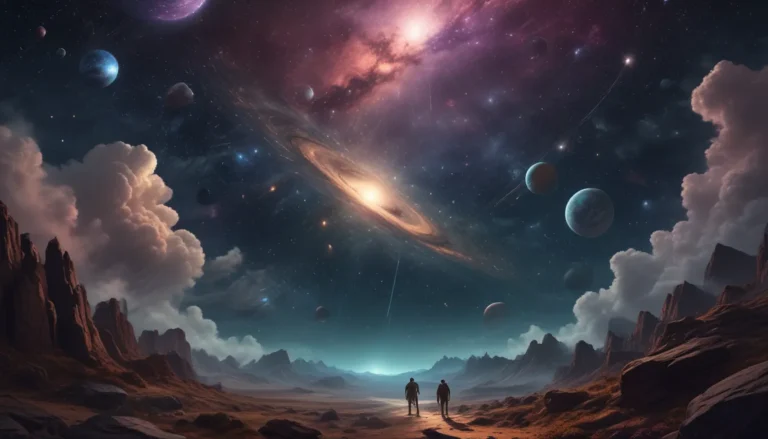The pictures we use in our articles might not show exactly what the words say. We choose these pictures to make you interested in reading more. The pictures work together with the words but don’t take their place. The words still tell you the important facts.
Embark on a journey through the vast expanse of the cosmos, where endless wonders and mysteries await. From the awe-inspiring beauty of distant galaxies to the enigmatic nature of black holes and dark matter, the universe continues to captivate and inspire us. Whether you are a space enthusiast or simply curious about our place in the cosmos, these 20 intriguing facts will leave you astounded and fascinated. So, fasten your seatbelts and get ready for an interstellar adventure through the cosmos!
Delving Deeper into the Cosmos
-
The Universe's Expanse: The cosmos, also known as the universe, is a vast expanse that has captivated the human imagination for centuries. It is filled with billions of galaxies, stars, and cosmic wonders that continue to inspire and captivate our imaginations.
-
Expanding Universe: Edwin Hubble discovered in the 1920s that the universe is constantly expanding, based on his observations of galaxies moving away from each other. This revelation has transformed our understanding of the cosmos and our place within it.
Unveiling Cosmic Marvels
-
Milky Way Marvel: The Milky Way, our home galaxy, is just one of billions of galaxies in the cosmos. It contains an estimated 100-400 billion stars and is a mere speck in the vast cosmic ocean of galaxies.
-
Starry Splendor: The number of stars in the universe is staggering, surpassing the grains of sand on all the beaches of planet Earth combined. This mind-boggling quantity highlights the infinite nature of the cosmos.
-
Dark Cosmos: Dark matter and dark energy, though invisible, make up around 95% of the total mass-energy content of the universe. These mysterious entities play a crucial role in shaping the cosmic landscape.
Peering Back in Time
-
Ancient Galaxy: The oldest known galaxy is over 13 billion years old, offering a glimpse into the early stages of the universe's formation. Observations made possible by the Hubble Space Telescope have revealed galaxies that date back to just a few hundred million years after the Big Bang.
-
Frozen Frontier: The temperature of outer space is close to absolute zero, with temperatures plummeting to just a few degrees above the lowest possible temperature. This frigid environment underscores the extreme conditions present in the cosmic expanse.
Mysteries of the Cosmos
-
Black Hole Enigma: Black holes are captivating cosmic phenomena where gravity is so intense that even light cannot escape their grasp. These enigmatic objects challenge our understanding of the fundamental laws of physics and the nature of space and time.
-
Cosmic Energies: Cosmic rays, high-energy particles from outer space, constantly bombard the Earth and other celestial bodies. Mostly consisting of protons and atomic nuclei, these energetic particles provide insights into the cosmic processes at play.
Exploring Cosmic Realms
-
Exoplanet Extravaganza: The cosmos is home to countless exoplanets, planets that orbit stars outside our solar system. Since the first discovery in 1992, astronomers have confirmed the existence of thousands of exoplanets, expanding our understanding of planetary diversity.
-
Time Capsule: Light from distant stars takes millions of years to reach us, allowing us to observe celestial objects as they were millions of years ago. The vast distances of space serve as a cosmic time machine, revealing the ancient history of the universe.
Cosmic Insight
-
Celestial Beauty: From dazzling nebulae to breathtaking supernovae, the cosmos is adorned with beautiful celestial objects that showcase its immense beauty. These stunning vistas offer a glimpse into the artistic grandeur of the universe.
-
Cosmic Echo: The Cosmic Microwave Background (CMB) is a faint radiation that permeates the entire universe, providing valuable clues about the conditions shortly after the Big Bang. This cosmic echo offers a window into the early moments of the universe's evolution.
Infinite Possibilities
-
Multiverse Theory: Some theories propose the existence of parallel universes within the cosmos, each with its own set of physical laws and realities. The concept of parallel universes expands our understanding of the vastness and complexity of the cosmic landscape.
-
Cosmic Explosions: Gamma-ray bursts are the most powerful explosions in the cosmos, emitting high-energy radiation in brief and intense bursts. These cosmic fireworks are often associated with the dramatic deaths of massive stars or the collision of celestial bodies.
Cosmic Architecture
-
Cosmic Web: The cosmic web is the largest known structure in the cosmos, a vast network of galaxies and galaxy clusters interconnected by filaments of dark matter. Spanning billions of light-years, this cosmic tapestry reveals the intricate architecture of the universe.
-
Cosmic Emptiness: While the universe is teeming with galaxies, stars, and celestial objects, the vast majority of space is empty, with expansive distances between cosmic structures. This emptiness underscores the vastness and scale of the cosmic void.
Cosmic Phenomena
-
Gravitational Lensing: Gravity has the power to bend and distort light in the cosmos, as predicted by Einstein's theory of general relativity. Massive objects can warp spacetime, causing light to follow curved paths around them, creating mesmerizing gravitational lenses.
-
Cosmic Odyssey: The study of the cosmos offers profound insights into our origins, the nature of matter and energy, and our place in the universe. By exploring the cosmic expanse, we unravel the mysteries of our existence and deepen our connection to the cosmos.
Inspiring Wonder
-
Cosmic Inspiration: The cosmos continues to be a source of inspiration and wonder, captivating our imaginations with its beauty, complexity, and mysteries. The endless discoveries and revelations in the cosmos ignite a sense of awe and curiosity about the unknown.
-
Inquisitive Spirits: Humanity's inherent drive to explore the cosmos is ingrained in our nature, fueled by a deep-seated curiosity and a quest for knowledge. Throughout history, humans have gazed at the stars, seeking to unravel the secrets of the cosmos and embark on daring journeys of discovery.
Embarking on Cosmic Adventures
In conclusion, the cosmos beckons us to explore its boundless mysteries and marvel at its cosmic splendor. Whether you peer through a telescope or ponder the wonders of the universe, there is always more to discover and learn. Let the cosmic revelations inspire you to gaze up at the night sky and ponder the infinite wonders that lie beyond our planet. As we delve deeper into the cosmos, we gain a deeper appreciation of our interconnectedness and the marvels that surround us. So, let's continue to explore, learn, and expand our knowledge of the cosmos and all its wonders.
FAQs
Q: How big is the universe?
A: The exact size of the universe is still unknown, but it is believed to be at least 93 billion light-years in diameter.
Q: Are there other galaxies in the universe?
A: Yes, there are billions of galaxies in the universe, each containing billions of stars.
Q: What is a black hole?
A: A black hole is a region of spacetime where gravity is so strong that nothing, not even light, can escape its gravitational pull.
Q: How old is the universe?
A: The current estimate is that the universe is approximately 13.8 billion years old.
Q: Can humans travel to other galaxies?
A: Currently, it is not possible for humans to travel to other galaxies due to the vast distances and limitations of our current technology.






